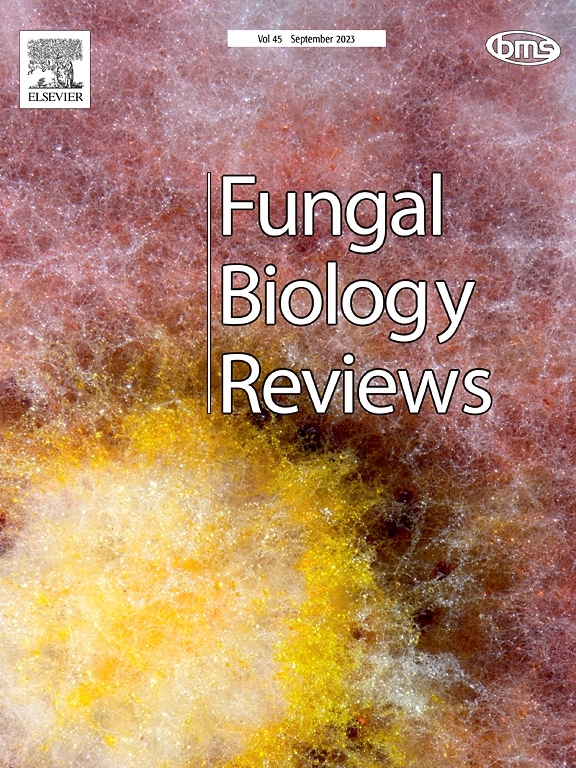An appraisal of the protection conferred by foliar Epichloë endophytes against root herbivores in plants: A meta-analysis
IF 4.6
2区 生物学
Q1 MYCOLOGY
引用次数: 0
Abstract
The role of foliar endophytes in modulating plant interactions with herbivores has been less investigated in belowground than aboveground environments. We studied how foliar Epichloë endophytes influence plant performance in the presence of root herbivores. We hypothesize that the endophyte-mediated increase in host performance in the context of root herbivory is due to the stimulation of plant growth in response to the herbivore attack (i.e., tolerance) and the presence of antiherbivore alkaloids in belowground tissues (i.e., resistance). We conducted a quantitative analysis of published results in relation to plant-Epichloë-root herbivore interactions and quantified the overall effects of endophytes on both biomass of plants in the presence/absence of root herbivores and performance of root herbivores. To gain further insights into plant-herbivore resistance, we assessed the in planta distribution of Epichloë-derived alkaloids and the responses of these compounds to the root herbivory. Endophytes increased plant growth in both presence/absence of root herbivores. Epichloë also reduced the herbivore performance, although the effect was dependent on the plant-endophyte association and herbivore type. Epichloë-derived alkaloids were generally less concentrated in belowground compared to aboveground plant tissues. However, the belowground:aboveground ratio for loline alkaloid concentrations was higher in plants in presence than absence of root herbivores, suggesting a local induction of resistance. Our results suggest that foliar Epichloë endophytes enhance plant tolerance to root herbivory by promoting plant growth and reducing root herbivore performance. The observed resistance may be partially explained by the action of Epichloë-derived alkaloids that are present in belowground tissues.
评价叶面Epichloë内生菌对植物根系食草动物的保护作用:荟萃分析
在地下环境中,叶面内生菌在调节植物与食草动物相互作用中的作用研究较少。我们研究了在根食草动物存在的情况下,叶面Epichloë内生菌如何影响植物的性能。我们假设,在根食草的情况下,内生菌介导的寄主性能的提高是由于植物生长受到食草动物攻击的刺激(即耐受性)和地下组织中抗食草动物生物碱的存在(即抗性)。我们对已发表的关于plant-Epichloë-root草食动物相互作用的结果进行了定量分析,并量化了在有/没有根食动物的情况下,内生菌对植物生物量和根食动物生长性能的总体影响。为了进一步了解植物-食草动物的抗性,我们评估了Epichloë-derived生物碱在植物中的分布以及这些化合物对根食草动物的反应。在根系食草动物存在或不存在的情况下,内生菌都能促进植物生长。Epichloë也降低了食草动物的表现,尽管这种影响取决于植物-内生菌的关联和食草动物的类型。Epichloë-derived与地上植物组织相比,地下生物碱的浓度一般较低。然而,在有根食草动物的情况下,植物的地下:地上碱浓度比高于没有根食草动物的植物,这表明局部诱导了抗性。我们的研究结果表明,叶面Epichloë内生菌通过促进植物生长和降低根系食草性来增强植物对根系食草性的耐受性。观察到的抗性可以部分解释为存在于地下组织中的Epichloë-derived生物碱的作用。
本文章由计算机程序翻译,如有差异,请以英文原文为准。
求助全文
约1分钟内获得全文
求助全文
来源期刊

Fungal Biology Reviews
MYCOLOGY-
CiteScore
10.60
自引率
0.00%
发文量
36
期刊介绍:
Fungal Biology Reviews is an international reviews journal, owned by the British Mycological Society. Its objective is to provide a forum for high quality review articles within fungal biology. It covers all fields of fungal biology, whether fundamental or applied, including fungal diversity, ecology, evolution, physiology and ecophysiology, biochemistry, genetics and molecular biology, cell biology, interactions (symbiosis, pathogenesis etc), environmental aspects, biotechnology and taxonomy. It considers aspects of all organisms historically or recently recognized as fungi, including lichen-fungi, microsporidia, oomycetes, slime moulds, stramenopiles, and yeasts.
 求助内容:
求助内容: 应助结果提醒方式:
应助结果提醒方式:


